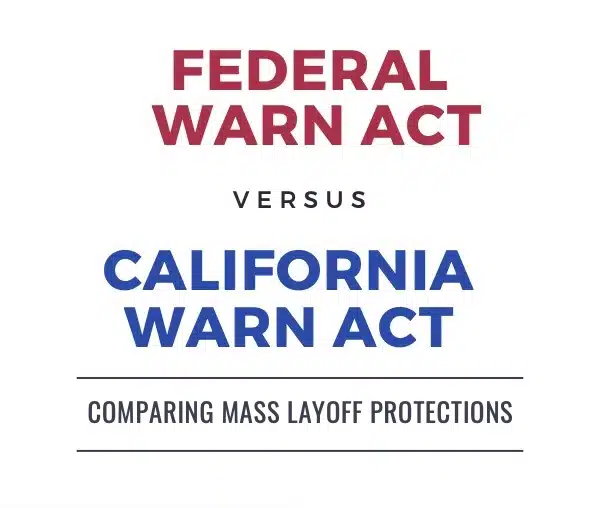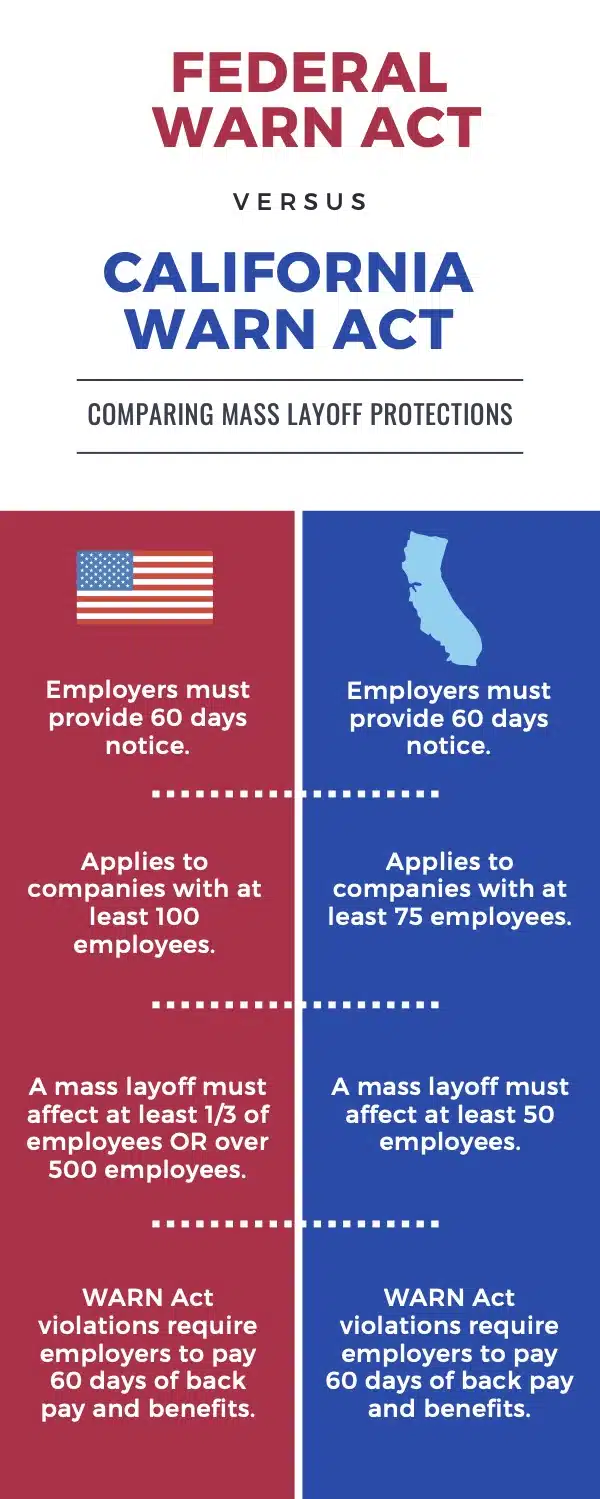Mass Layoffs and the WARN Act in California
Mass layoffs harm workers and communities.
The WARN Act protects workers.
Silicon Valley tech layoffs have affected thousands of Californians. Other California companies have also laid off employees in recent months.
These mass layoffs hurt workers. The California WARN Act protects employees during mass layoffs.
In California, employers must provide notice before a mass layoff. If they fail to provide notice, they must pay WARN Act penalties, including to employees. That means workers can get back pay and benefits for 60 days.
If you’ve been affected by a mass layoff or plant closure, the WARN Act can guarantee you 60 days of pay and benefits. An employment lawyer can file a WARN Act class action lawsuit against your employer for violations.
The WARN Act in California
In California, state law protects workers during mass layoffs. The California WARN Act has some of the strongest protections in the country.
The WARN Act in California applies to companies with at least 75 workers, including part-time workers. In contrast, the federal WARN Act requires 100 full-time workers. That means California’s protections cover more people.
If California businesses lay off 50 or more employees, they must provide WARN notification. Employers must also notify workers before any plant closure.
The California WARN Act also applies to relocations of at least 100 miles.
WARN Notice Requirements in California
What is a WARN Act notice? California’s WARN Act requires employers to provide a WARN notice to their employees before a mass layoff.
A CA WARN notice must include:
- Whether the layoff is permanent or temporary
- The date of the layoff and the last date of work
- Contact information to receive additional information
This WARN notice must be in writing. A verbal announcement does not count as notice. In addition, layoff notices in regular pay statements do not meet the 60-day notice requirement.
If your employer notifies you less than 60 days before your layoff date, you may have a WARN Act case.
WARN Act California: Violations and Penalties
Companies that commit WARN Act violations face penalties, including back pay and benefits to their employees.
WARN Act penalties in California include:
- Back wages
- Benefits
- Civil penalties
Companies that violate the WARN Act in California, for example, pay a $500 civil penalty per day for every violation.
The court system enforces the WARN Act. That means workers can file a lawsuit, including a class action suit, for WARN Act violations.
The Federal WARN Act
In addition to the California WARN Act, Golden State workers are also covered under the federal WARN act. The WARN Act protects workers when companies announce mass layoffs. As with California’s law, the federal WARN Act requires at least 60 days’ notice before a mass layoff.
The federal WARN Act applies to companies with at least 100 employees when they lay off at least 50 employees.
If companies violate the WARN Act, they must pay penalties to their employees. These include back pay and benefits for the 60 days prior to a layoff.
Learn more about WARN Act protections in other states.
Comparing the Federal and California WARN Acts
Workers affected by mass layoffs have different protections under the federal and California WARN Acts.
Both the federal and CA WARN Acts require 60 days’ notice before a mass layoff or plant closure.
The federal WARN Act applies to companies with at least 100 employees, not including part-time employees. The WARN Act in California applies to companies with at least 75 employees, including part-time employees.
These two acts also define mass layoffs differently. Under federal law, a mass layoff must affect at least a third of employees OR over 500 employees. The WARN Act CA applies when as few as 50 employees lose their job.
Both the federal and California WARN Acts require employers to pay 60 days of back pay and benefits for violations.
WARN Act FAQ
What is the WARN Act?
The WARN Act requires employers to provide notice before mass layoffs or plant closures.
Under the federal WARN Act, employers must give at least 60 days’ notice if they lay off more than one-third of workers OR more than 500 employees.
Many states have their own WARN Acts. Under the California WARN Act, employers must give at least 60 days’ notice if they lay off more than 50 workers.
Employers must also notify their employees about the sale of the business if it may lead to layoffs or closures.
What is the WARN Act in California?
The California WARN Act includes stronger mass layoff protections than the federal WARN Act. Both acts require at least 60 days’ notice. Employees can sue for 60 days’ wages and benefits if they do not receive notice.
However, the WARN Act CA covers more workers. The federal act only applies to companies with at least 100 employees, not including part-time employees. The CA WARN Act covers companies with at least 75 employees, including part-time workers.
California’s WARN Act also covers layoffs that affect 50 employees in a 30-day period. The federal law only applies to mass layoffs of 50 employees if that’s more than one-third of employees OR layoffs of over 500 employees.
What is a mass layoff under the WARN Act?
Under the federal WARN Act, a mass layoff is:
- 50 employees (at least ⅓ of the company’s workforce) laid off in a 30-day period
- 500 employees laid off in a 30-day period, regardless of company size
- Closing down a work site and laying off at least 50 employees in a 30-day period
The WARN Act in California uses a different definition of a mass layoff:
- 50 employees (at a company with at least 75 employees)
- Plant closures of any size
The WARN Act CA uses a smaller definition of mass layoff, so it covers more workers.
What is the purpose of the WARN Act?
The WARN Act gives workers time to prepare for a layoff. Advanced notice means workers can prepare for the job market, learn about unemployment insurance, or apply to training programs. The WARN notice requirement increases the chances of finding a new job.
The WARN Act also helps workers receive information about unemployment insurance, workforce training programs, and other unemployment support from local governments. In California, the WARN Act CA provides stronger protections than the federal WARN Act.
What is a WARN notice?
A WARN notice informs employees of mass layoffs or closures. By providing notice, employers give their workers time to look for a new job and prepare for the end of their current job.
The WARN notice must state:
- If the layoff is permanent or temporary
- The date of the layoff and the final date of work
- Contact information for additional information
If companies do not provide WARN notice 60 days before the layoff date, they violate the WARN Act. Employees can sue their employer for back pay and benefits. Both the federal act and the WARN Act CA require notice.
What are WARN Act penalties?
Employers who violate the WARN Act face civil penalties. WARN Act penalties include daily fines and back pay for workers.
For example, if a company laid off 500 workers and did not provide a WARN notice, those employees can file a class action lawsuit to recover 60 days of pay and benefits for each affected worker.
What about the WARN Act CA? In California, you can recover up to 60 days of pay and benefits if your employer failed to provide notice of a layoff affecting 50 or more workers.
If you were laid off and your employer did not provide a WARN notice, contact an employment lawyer to find out if you have a WARN Act case. Employment lawyer Charles Joseph offers free consultations on WARN Act cases.

